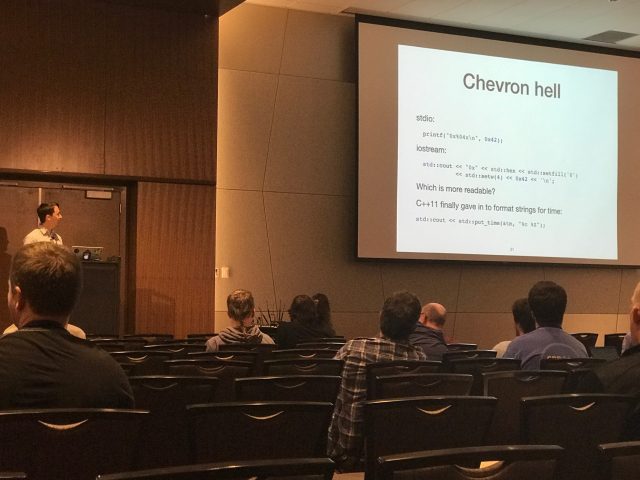CPPCON Day #5. Miscellaneous--"No Bugs" Hare
Last of the serie.
CPPCON Day #5. Miscellaneous
by "No Bugs" Hare
From the article:
I’m back from #CPPCON2017 now, and can report on the last day of it...
March 11-13, Online
March 16-18, Madrid, Spain
March 23-28, Croydon, London, UK
March 30, Kortrijk, Belgium
May 4-8, Aspen, CO, USA
May 4-8, Toronto, Canada
June 8 to 13, Brno, Czechia
June 17-20, Folkestone, UK
September 12-18, Aurora, CO, USA
November 6-8, Berlin, Germany
November 16-21, Búzios, Rio De Janeiro, Brazil
By Adrien Hamelin | Oct 6, 2017 10:53 AM | Tags: community
Last of the serie.
CPPCON Day #5. Miscellaneous
by "No Bugs" Hare
From the article:
I’m back from #CPPCON2017 now, and can report on the last day of it...
By Adrien Hamelin | Oct 4, 2017 12:53 PM | Tags: community
Another trip report!
CppCon 2017 Trip Report
by Matt Godbolt
From the article:
Until last week I had never been to a C++ conference before. I’m rather glad to say that I’ve now experienced the wonder of having a firehose of C++ knowledge plugged into my brain and turned on.
Most of the best times at the conference were in between talks, where random meetings in the hallways over coffee would yield fascinating discussions. I was flattered to have a fair number of people spot my name badge and come up and thank me for Compiler Explorer – a very surreal experience. I got a tiny taste of what it must be to be “famous”! I also got a lot of advice and ideas on how to improve the site, and once the dust settles a little I look forward to getting stuck into improvements, like more Microsoft compilers (and a better compilation experience for those using it), and execution support.
While the hallway chance encounters (and lunches and dinners) yielded a lot of great conversations, the talks were also full of information. Below is a small taste of some of the talks that left an impression with me...
By Adrien Hamelin | Oct 4, 2017 12:40 PM | Tags: community
From another first-time attendee.
CPPCon 2017
by Oliver Smith
From the article:
I love and hate conventions, so I don’t go to them all that often.
Although I’ve watched CPPCon videos, I hadn’t considered something you attended until this year; I wasn’t really convinced it would be worth going.
The agenda for the first few days proposed some very interesting stuff, and I decided to dip my toe...
By Adrien Hamelin | Oct 3, 2017 11:24 AM | Tags: community
The title says it all.
CppCon 2017 Trip Report
by Ben Deane
From the article:
Last week in Bellevue, WA, around 1100 C++ programmers got together for CppCon. I love this conference – it’s a chance to meet up with my existing C++ community friends and make new ones, to learn new techniques and explore parts of C++, and to get excited about where C++ is headed in the next 5 years. Just about everything in C++ is represented, from low-level optimization techniques to functional template metaprogramming...
By Adrien Hamelin | Oct 3, 2017 11:22 AM | Tags: community
The title says it all.
CppCon 2017 Trip Report
by Charles L. Wilcox
From the article:
Another CppCon draws to a close, and the future looks healthy and exciting. Also, I finally gave a Lightning Talk.
Overall, the conference experience this year was very smooth, compared to my last two times here, despite the conference growth. There were over 1100 attendees, up from about 900 last year. There were sometimes 7 concurrent tracks, which is larger than years past. Again, with most every time-slot I suffer from the paradox of choice, and if I chose a less than stellar talk, I regret what I’m potentially missing elsewhere.
By Adrien Hamelin | Oct 3, 2017 11:15 AM | Tags: community basics
A wonderful tale to read.
A Beginner's Guide to CPPCon 2017
by Eva "Bunny" Conti
From the article:
When we last left our heroine, she was just stating that although she'd be accompanying Ben to Seattle for his talk at CPPCon 2017, she wouldn't be attending the actual conference...
By Adrien Hamelin | Oct 2, 2017 12:23 PM | Tags: community
It's over, but we still have reports!
#CPPCON2017. Day 4. Async Rulezzz!
by "No Bugs" Hare
From the article:
During the Day 4 of CPPCON, I had to prepare to my own talk tomorrow; still – I was able to attend all the talks I was interested in.
But before I can start – let’s discuss a thing which I just understood during CPPCON17; it is related to…
By Adrien Hamelin | Sep 28, 2017 11:07 AM | Tags: community
The series continues.
#CPPCON2017. Day 3. The Future of C++
by "No Bugs" Hare
From the article:
At #CPPCON2017 Day 3, I spent most of the time on the meetings of SG14 (on games and low-latency stuff); while it was certainly useful for me – the most interesting things on Day 3 happened outside of SG14.
By Adrien Hamelin | Sep 27, 2017 12:46 PM | Tags: community
The conference continues!
#CPPCON2017. Day 2. Why Local Allocators are a Good Thing(tm) Performance-Wise, and Why I am Very Cautious about C++17 STL parallelized algos
by "No Bugs" Hare
From the article:
At CPPCON2017 Day 2, two talks were of special interest to me. One was a 2-hour talk about Local Allocators – and another about C++17 STL parallelised algorithms.
By Adrien Hamelin | Sep 26, 2017 12:53 PM | Tags: community
 Cppcon continues!
Cppcon continues!
#CPPCON2017. Day 1. Hope to get something-better-than-chevron-hell
by "No Bugs" Hare
From the article:
IMO, the most important thing which has happened on Day 1 was a series of discussions about potential replacement for overloaded operator << in iostreams <yay! />.